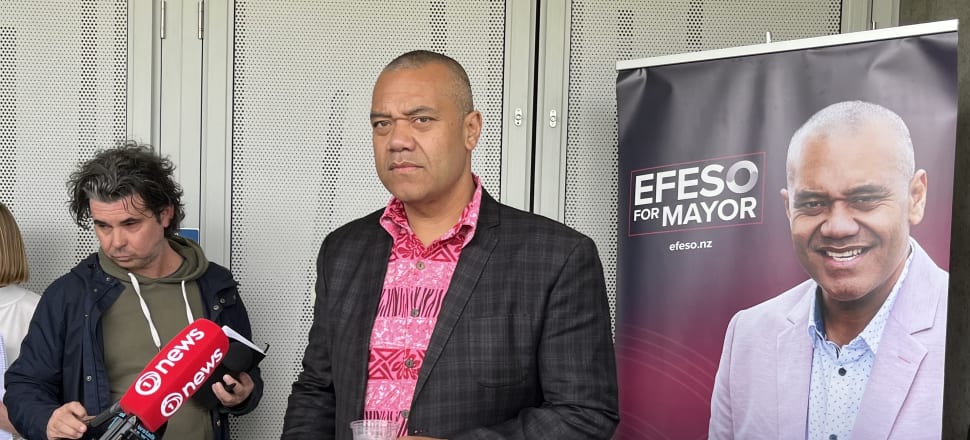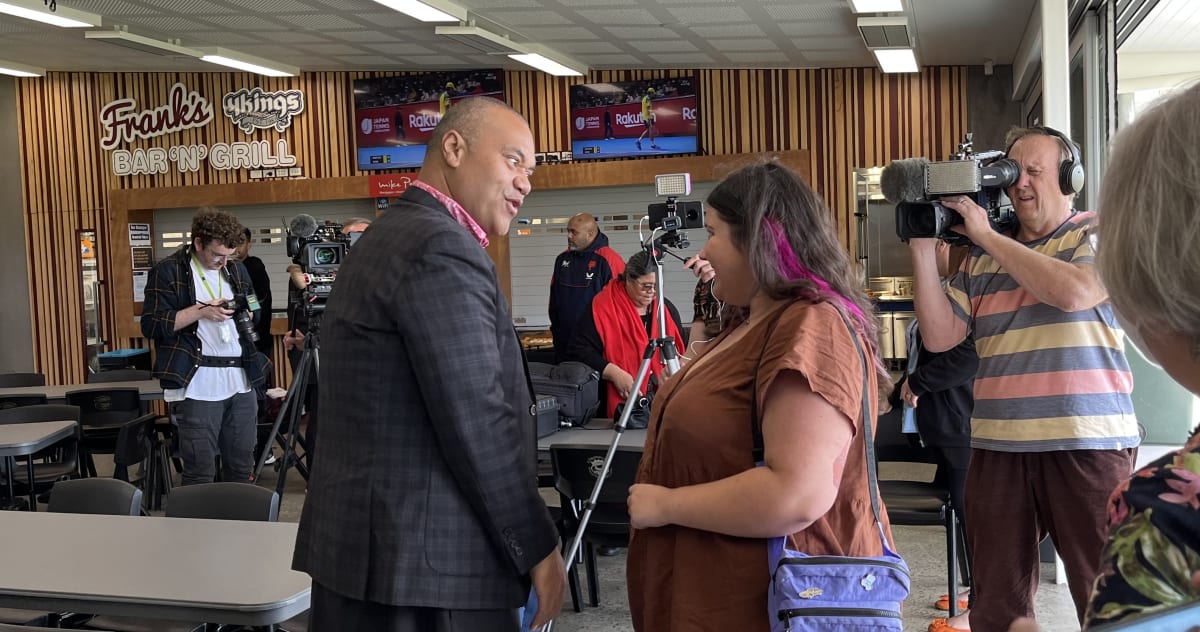
After a long and hard campaign, Efeso Collins was disappointed but philosophical as he conceded defeat to Wayne Brown today and bowed out of the political arena
A waning public appetite for Labour-endorsed candidates, unconscious bias and low voter turnout in his home suburbs may have been the nail in the coffin for the mayoralty of Efeso Collins.
After a hard-fought campaign of many months, Collins was bested today by Wayne Brown in the race for Auckland’s top job, losing by more than 54,000 votes.
It was a disappointingly large gap for Collins and his campaign team, who gathered at the Ōtara Scorpions Rugby League Club to either celebrate or commiserate.
It ended up being the latter, with the news breaking some half an hour before Collins’ arrival. The mood amongst supporters was uneven, with the lyrics to John Holt’s ‘The Tide is High’ blaring out over the sports club as the amassed group awaited the arrival of their rejected leader: “The tide is high but I’m holding on, I’m going to be your number one.”
Collins received just under a third of the vote at 29 percent, while Brown had almost half of the eligible voters in the city with 47 percent. Craig Lord was a distant third with 6 percent or 18,293 votes.
But despite the significant discrepancy in votes between him and his biggest rival, Collins put on a brave face for the cameras and said he was proud of the campaign he had run.
“I know some of you will be feeling really disappointed,” he said to the waiting crowd. “But by the time we leave this room, you will be ready to start the next election campaign.”
Despite this, Collins made it clear that barring unforeseen circumstances, that’s a bow on his political career. It’s the end of nine years in local government, and despite some talk from Brown last week that he could have a ready future on the Labour list for central government, Collins ruled a move to Wellington out, too.
He was tight-lipped on where else he might look, but alluded to a few job offers he’d had this very morning.
“I said no you've got to show more faith,” he joked. “I might have to go back to them this afternoon.”

There were clear roadblocks he and his team were unable to overcome, not least of which the impatience of many Aucklanders with the perceived establishment actors of the Labour Party and the fact Collins would have been the first Pasifika mayor of the city in history.
“I think the message has changed. I think to some degree the right used this as a primary for themselves and they got themselves sorted out. We always knew from a strategic perspective that that would always challenge us,” he said. “It was an uphill battle from the beginning, we knew that.”
The shift towards the centre-right is evident in the ward councillor results, with centre-left voices like Pippa Coom and the retiring Cathy Casey being replaced by those with centre-right bonafides or at least endorsements, such as Will McKenzie in the Albert-Eden-Puketāpapa ward and Mike Lee in Waitemāta.
And how much of Collins’ defeat can be put down the colour of his skin?
Collins himself was diplomatic in his treatment of the subject, saying while he had received some vicious racist jibes during the campaign, he didn’t think there was a problem with racism across the city.
However, he did acknowledge the effect of unconscious biases that could have hurt his take of the votes.
“I remember when we did a focus group and that focus group came back and said one of my biggest challenges in an electoral campaign is going to be the colour of my skin, and I can't change that,” he said. “But what I think I have done really well is convince Aucklanders that I've got the competency, the skills, the communication oratory skills - that’s all anyone seems to be talking about - and I hope one day we'll all be coming on an equal footing.”
A bigger bugbear he has about how the election has gone down has to do with voting processes.
“Last night we had people turned away in Mt Roskill, we had queues of people turned away trying to get late votes in today,” he said. “The system doesn’t work.”
Instead of postal ballots, he said local government needs to mirror the electoral processes of central government, prioritising in-person voting at the local church or school.
“We know that in poorer more vulnerable communities often those ballot papers are going to their last addresses ... the easiest thing to do in my view is make sure it matches the central government style,” he said.
His comments do match with the data on voter turnout over the past few weeks, which has shown suburbs like Ōtara, Henderson and Mangere with some of the lowest turnouts in the city.
There may be other factors at play, such as voters in these areas not feeling reflected by their candidate options, or different levels of political literacy.
Collins had a message directly for Auckland’s Pasifika community, thanking them for their support and hoping he had normalised the idea of a mayor from the islands.
“I hope that young people and young brown kids in particular look at my candidacy and go ‘Wow, it’s normal now.’
He said his 10-year old nephew had told him he had his eyes set on the mayoralty one day now, which Collins hopes is proof that he’s done something to normalise the idea of a Samoan or Tokelauan person wearing the mayoral chains.
As the biggest Pasifika city in the world, perhaps that would be more than fitting.
But for now, Aucklanders have had their say - or at least a third of them have.
Collins admitted that Brown had won a strong democratic mandate.
“That’s what the city asked for, and if that’s what the city wants…” he said. “The electorate has spoken.”
When asked if he was disappointed that Brown was mayor, Collins was diplomatic.
“No, I’m just disappointed that I’m not mayor.”







